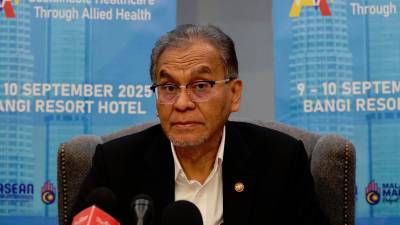PETALING JAYA: Malaysia must move quickly to reform its healthcare system as demographic shifts, rising chronic diseases and mounting financial pressures threaten to overwhelm public services, said Health Minister Datuk Seri Dr Dzulkefly Ahmad.
Speaking at the 14th Allied Health Scientific Conference 2025, he said Malaysia’s gains in extending life expectancy and improving maternal and child health risk being overshadowed by new challenges.
“By 2030, 15% of Malaysians will be above 60. Non-communicable diseases already account for more than 70% of premature deaths, costing RM64.2 billion annually.
“Our workforce is stretched thin, overworked and overburdened while financial pressures demand a system that is both equitable and sustainable.”
He said Malaysia’s dual healthcare system is increasingly lopsided, with public hospitals bearing most of the load while private facilities remain underutilised.
“Without intervention, the gap will only grow. The task is clear – strengthen the public system to deliver universal health coverage while giving the private sector a structured, complementary role.”
Dzulkefly said health financing has been prioritised under the 13th Malaysia Plan and in the upcoming Budget 2026 as out-of-pocket payments remain high.
“Malaysians still spend about 36% of total health expenditure from their own pockets, nearly double the World Health Organisation’s recommended benchmark of below 20%.
“To fix this, we need a financing model that is equitable, sustainable and future-proof.”
He outlined reforms under the Reset framework, developed with the Finance Ministry, Bank Negara and the Employees Provident Fund, bringing several initiatives under one umbrella.
These include RakanKKM (premium services in public hospitals with revenues reinvested), the Medical and Health Insurance/Takaful scheme (a voluntary option for middle-income families), the Diagnosis Related Groups model (a performance-based hospital payment system), and the National Health Fund (a pooled fund from taxation, levies and contributions).
“Every ringgit collected will be ring-fenced and channelled back into strengthening our public health system.
“Let me be clear. This is not privatisation. These reforms are about strengthening our public system because only the public system serves every Malaysian, in every corner of the country.”
Turning to digitalisation, Dzulkefly said reforms are already showing results, with electronic medical records now used in 275 health clinics and 22 public hospitals.
